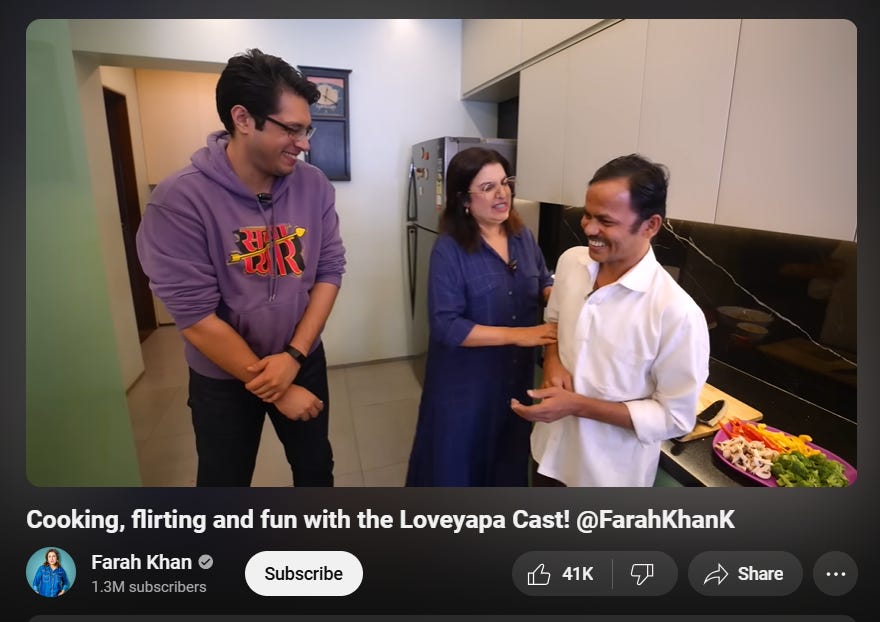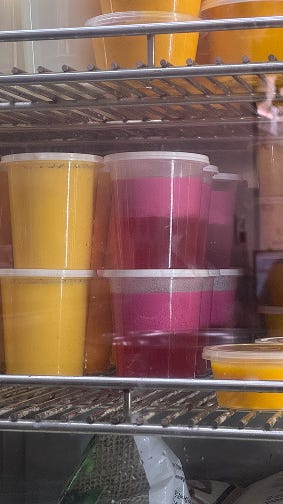Prepping (#1) : Relying on others, well-stocked pantry and some tips
Prepping everyday for everyday
If you like what we do, share our magazine with people. We want the magazines to find more homes.
If you want to support our work beyond the magazine, please consider becoming a paid subscriber. Your contributions will help us keep dhoop going for longer. As a paid subscriber, you will be the first to know all about ISSUE #3 theme, get recommended readings, events info, merch drops ( yes, totes are coming back!! ) and get a full preview of past issues.
A bag of methi leaves, neatly wrapped in paper, then in a plastic bag is in my fridge for over 4 days now. Every morning, I take it out of the fridge, hoping to clean the leaves, remove the stems, and cook with it. However, in my head, it seems like a lot of work — I cannot even get myself to start. I rethink my decisions, wishing that I could have just Instamart-ed it and chosen already- cleaned methi leaves. And with that thought, I seal the bag again and shove it into the corner of my fridge.
I have repeatedly tried to make two fresh* meals a day for myself. To do that I have to make a plan, prep stuff in advance so that I don’t spend 2 hours in the kitchen during workdays. The cooking does not take as much time as cleaning and prepping stuff (the hours I spend doing this feels more because I don’t necessarily enjoy it). And, this is coming from someone who lives alone! To imagine doing all of this for a family seems too daunting a task. One of my friends Pankhuri Agrawal, who brings together people interested in history & culture of food in India through book clubs, pointed out that “there are too many meals to take care of…school lunch, school snack, breakfast, lunch, after school snack, dinner and homemade treats + intergenerational needs.” There is, I believe, an unusual kind of orderliness, organisation skill and tenacity needed to be able to put food for the table of multiple people in the household.
Domestic help, helpers and cooks
In India, having someone who helps you in the smooth functioning of the house/kitchen is normalised1. A lot of tasks, like cleaning vegetables, prepping them for a meal, washing the piles of utensils, cleaning the kitchen slab, throwing the leftovers, and sometimes cooking are outsourced. I don’t think I am fully prepared to write this yet. To unpack the politics involved in the someone doing your (and my) dirty work.2 People still don’t actively talk about it, but it has been slowly coming up in conversation with people sharing their own versions of it on social media. Heena Ali, a cook who lives in Mumbai, documents how she goes from one house to another, cooking a variety of meals, cleaning the kitchen and then going back to her own home to cook. Farah Khan, a Bollywood celebrity has made her cook, Dilip a Youtube sensation by (a) inviting people into her home by showing BTS of what ‘celebrities’ eat (b) normalising having someone who cooks for them and making it visible that Dilips cooks in the kitchen, while the guest and the host, sit in the living room, away from the heat of the kitchen. That’s not it, the viewers also seem to enjoy the banter Farah Khan and Dilip share, and often support him in moments of conflict. You can also see similar content on a spice company Diaspora Co.’s Instagram feed where the founder’s home-cook is featured in the reels, making food for the family or putting together recipes using the brand’s spices.
It’s not only about cooking, it is also about the pre-cooking and post-cooking tasks that take over so much mind and space and time. When I lived in a joint family (14 people in the same house), my mother, with my two aunts, made 3 meals a day.3 When we finally moved out 20+ years later, my mother’s relationship with cooking strained — we hired someone to cook for us. It somehow felt liberating. To let someone do the work she never enjoyed in the first place, but had to do.
Dried Chanterelle, tomato flakes, Indira’s rasam paste, and jirawan in my pantry?
Sometimes I get lazy to cook, sometimes I am ravenous after a workout or just too bored with my own cooking. What helps in the aforementioned times is having supporting actors that amp up meals and cover up for the lack of skills, prep, or ingredients. I sometimes forget what I have in my pantry…something that I am not trying to keep a track of following OLGA KOUTSERIDI’s M.U.V.K.I.S: My Unfussy Visual Kitchen Inventory System.4
Having some condiments/flavour enhancing things can make meals delicious. A few things I have been lately obsessed are rasbhari cheong, PAUL and THOMAS’ Bruschetta mix, Indira’s rasam ( OMG!!!!), jirawan and mushrooms.
A little help goes a long way
Whenever I take a stroll in the mandis of my neighbourhood, I notice alteast one person selling a variety of sprouts — chickpeas, moong, kulith, kala chana etc — the job of soaking, sprouting is done for you. Often I notice a woman sitting on the side of the street, grating fresh coconut. Shopkeepers peel garlic, hara chana, toor and keep it ready for buyers. A shop next to my house sells roasted peanuts, and lightly salts them if you want. If you notice closely, a lot of prep is already done for you!5
Some learnings from friends/friends on the internet and some from me (in that order):
Nayantara Memon Bangla, a Chef, Nutrition & Lifestyle Coach’s, meal prep technique of using clear, transparent boxes to store produce in the fridge, so that you can see what you have and nothing wilts in the corners is super useful.
Aniruddh Das’s idea of making a sauce/condiment that can be used for different animal protein like chicken, prawns and basa. Make one sauce and use it for all proteins with similar texture.
Richa Singhi’s ice cube technique of grinding fresh/seasonal produce in large batches and freezing them into ice cubes for instant use is a useful one. She has an ice-cube for everything — coriander chutney, ginger, lemon juice etc.
Keertida Phadke, a chef, tells me that there’s always something that’s soaking (lentils, chickpeas etc) in her kitchen. There are a lot of benefits if you soak — think spouts, dals, hummus etc.
I like to batch cook for 2 days. I often have rice in my fridge.
Always have homemade chutneys in your fridge. Whenever I have coriander mint chutney or coconut chutney, I can always build it into a meal.
How do you prep? Tell us!
This hypothesis is based on observation and conversation with people who cook at home.
I say dirty work as an umbrella term for all the work people outsource and it does not refer to work that is dirty or reflect my opinion of what what is considered to be dirty.
We also had people who helped us around the house to buy stuff from the market, prep vegetables and clean.
I am extremely inspired to document my pantry. Thanks for the inspiration.
I have a lot to say about the informality of out markets and the privilege of access to fresh produce. I am writing a more detailed version of this in the upcoming months. If you have nay thoughts on this, feel free to share it.
Food is a portal to understanding our world, our communities and ourselves. It provides a unique and critical perspective on everything—from everyday habits to global issues, from the way we design our countries, cities to how we navigate climate crises.
dhoop uses food as a lens. Through this lens, we can interrogate culture, sustainability, design and the systems that sustain life. Initially, we started as a magazine focused on stories of food and its intersections. Over time, it has grown into something more profound—a space, a research platform, embracing a multidisciplinary approach that invites collaboration and deeper inquiry.













